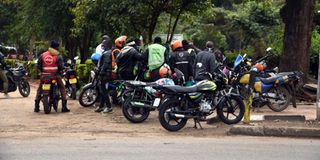IG warns boda boda riders against violence after accidents

Boda boda riders are pictured off Uhuru Highway, next to Freedom Corner, in Nairobi on January 12, 2021.
What you need to know:
- Inspector-General Hillary Mutyambai noted an emerging culture of impunity and lawlessness that has seen accident victims assaulted and vehicles burnt.
All boda boda riders who take matters into their own hands and engage in acts of lawlessness, especially after accidents, will be dealt with accordingly.
Inspector-General Hillary Mutyambai issued this warning in a statement on Thursday, noting an emerging culture of impunity and lawlessness that has seen accident victims assaulted and vehicles burnt.
Mr Mutyambai said the National Police Service will map out major hotspots for such incidents and undertake a major operation to address the problem.
“Boda boda riders must adhere to all traffic regulations and all laws of public order and decency, failure of which they will be dealt with in accordance with the law, individually,” said the IG.
He advised riders who get involved in accidents or security-related matters to inform officers at the nearest police stations or security offices.
“All police officers have been directed to be on the lookout and take necessary lawful action against any boda boda riders found taking [matters] into their own hands,” he said.\
Recklessness
Boda bodas are popular means of transport in both rural and urban areas but inadequate regulations have seen an increase in recklessness among the operators.
A 2019 report on security challenges in the transport sector stated that boda bodas are the leading cause of deaths by dangerous driving and that operators have been linked to incidents of general stealing, assault, robbery with violence, murder, kidnappings and abductions as well as drug trafficking.
The crimes were attributed to increased unemployment and idleness among the youth, poverty, drug and substance abuse, weak regulations in the sub-sector, greed for quick money, peer pressure, corruption among law enforcers, easy access to firearms through porous borders and a high cost of living.
The report recommended regulation of the sector through saccos and associations, increased police checks, community policing, limited operation hours and street lighting.
It also advised moving the industry from the informal to the formal sector of the economy and introduction of training subsidies for riders.




